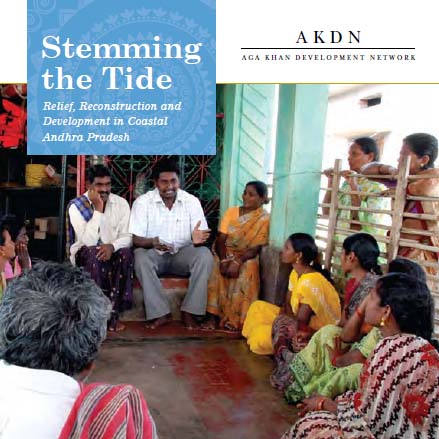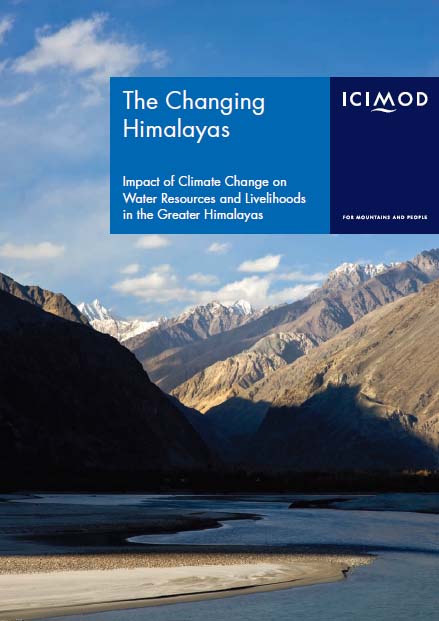Rivers
Stemming the tide - Relief, reconstruction and development in coastal Andhra Pradesh – A report by Aga Khan Development Network
Posted on 05 Aug, 2011 02:35 PM Its aim aim was to improve the capacity of target communities to better manage in times of disaster. To set in motion a process that would sustain a short-term project, the Aga Khan Development Network drew on guiding principles developed from its experiences of projects in disaster reconstruction and more comprehensive development programs: high-quality community-based interventions, working on multiple fronts, and fostering linkages with strong institutional partners.
Its aim aim was to improve the capacity of target communities to better manage in times of disaster. To set in motion a process that would sustain a short-term project, the Aga Khan Development Network drew on guiding principles developed from its experiences of projects in disaster reconstruction and more comprehensive development programs: high-quality community-based interventions, working on multiple fronts, and fostering linkages with strong institutional partners.
At the core of the project’s disaster management and mitigation strategy was the creation of empowered and highly motivated community-based organizations; their participation was critical in shaping and implementing initiatives that would best serve the needs of the vulnerable, particularly women and children.
Small and mini hydel projects – Standing Committee on Energy – Sixteenth Report (2010-2011)
Posted on 03 Aug, 2011 03:57 PMThe Committee took evidence of the representatives of the Ministry of New and Renewable Energy (MNRE) in January, 2011.
Troubled waters - Climate change, hydropolitics and transboundary resources – A report by TERI and The Henry L Stimson Center
Posted on 02 Aug, 2011 07:38 PMThis report is a part of Stimson’s Regional Voices: Transnational Challenges project and provides valuable cross-regional and multidisciplinary insights into the complex issues surrounding transboundary water resources and climate change. It examines the environmental dangers and policy dilemmas confronting the sustainable management of shared water resources in a warming world.
Dialogue on mainstreaming river basin planning, River Research Center, 9-11th August 2011, New Delhi
Posted on 28 Jul, 2011 05:15 PMOrganisers:
River Research Centre, Kerala
Legal Initiative for Forest and Environment, New Delhi
Gomukh Environmental Trust for Sustainable Development, Pune, Maharashtra
Manthan Adhyayan Kendra, Badwani, Madhya Pradesh
International Rivers, South Asia office, Mumbai, Maharashtra
A late twentieth century folk tale - How rainwater harvesting creates a river in Alwar, Rajasthan
Posted on 28 Jul, 2011 03:30 PMVideo courtesy: Soumitradey
The changing Himalayas - Impact of climate change on water resources and livelihoods in the Greater Himalayas – A report by ICIMOD
Posted on 27 Jul, 2011 09:56 PM The greater Himalayan region “the roof of the world” – contains the most extensive and rugged high altitude areas on Earth, and the largest areas covered by glaciers and permafrost outside the polar regions.
The greater Himalayan region “the roof of the world” – contains the most extensive and rugged high altitude areas on Earth, and the largest areas covered by glaciers and permafrost outside the polar regions.
The sector programme and climate change initiatives in Uttarakhand
Posted on 27 Jul, 2011 02:54 PMRecent scientific studies show that global warming is already causing environmental changes that will have significant global economic and social impacts. As the world's 4th largest emitter of greenhouse gases, India has to juggle the imperative demand for economic development with pressures for greater efficiency in the use of energy.
Climate change is a change in the statistical properties of the climate system when considered over long periods of time, regardless of cause. Climate change reflects a change in the energy balance of the climate system, i.e. changes the relative balance between incoming solar radiation and outgoing infrared radiation from Earth. The threat emanates from accumulated green house gas emissions in the atmosphere, generated through long term and intensive industrial growth and high consumption life styles of developed countries.
Geomorphic study for regeneration of aquatic ecosystem in Bareilly – An article in Geospatial World
Posted on 17 Jul, 2011 10:53 AMIt indicates that the aquatic ecosystem of an area disappeared due to unplanned development of agro ecosystems and human settlements. This area was earlier covered with ponds, wetlands and ox-bow lakes. Now, during the rainy season, inhabitants of these wards face severe problem of water logging and pollution.
Water quality status of rivers in India – Report of Central Water Commission
Posted on 15 Jul, 2011 06:19 PMThe Level-I Laboratories are located at 258 field water quality monitoring stations on various rivers of India where physical parameters such as temperature, colour, odour, specific conductivity, total dissolved solids, pH and dissolved oxygen of river water are observed.




